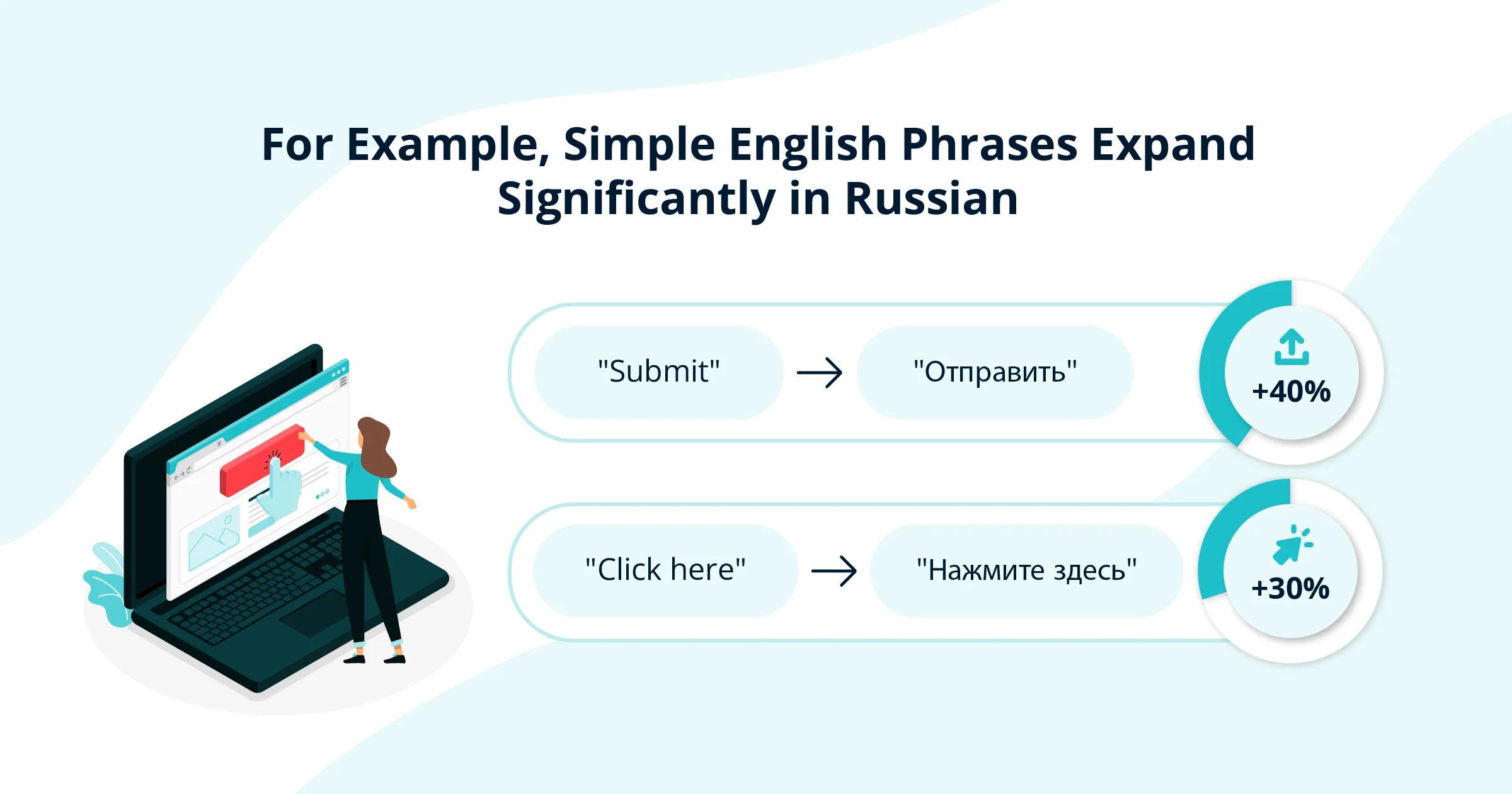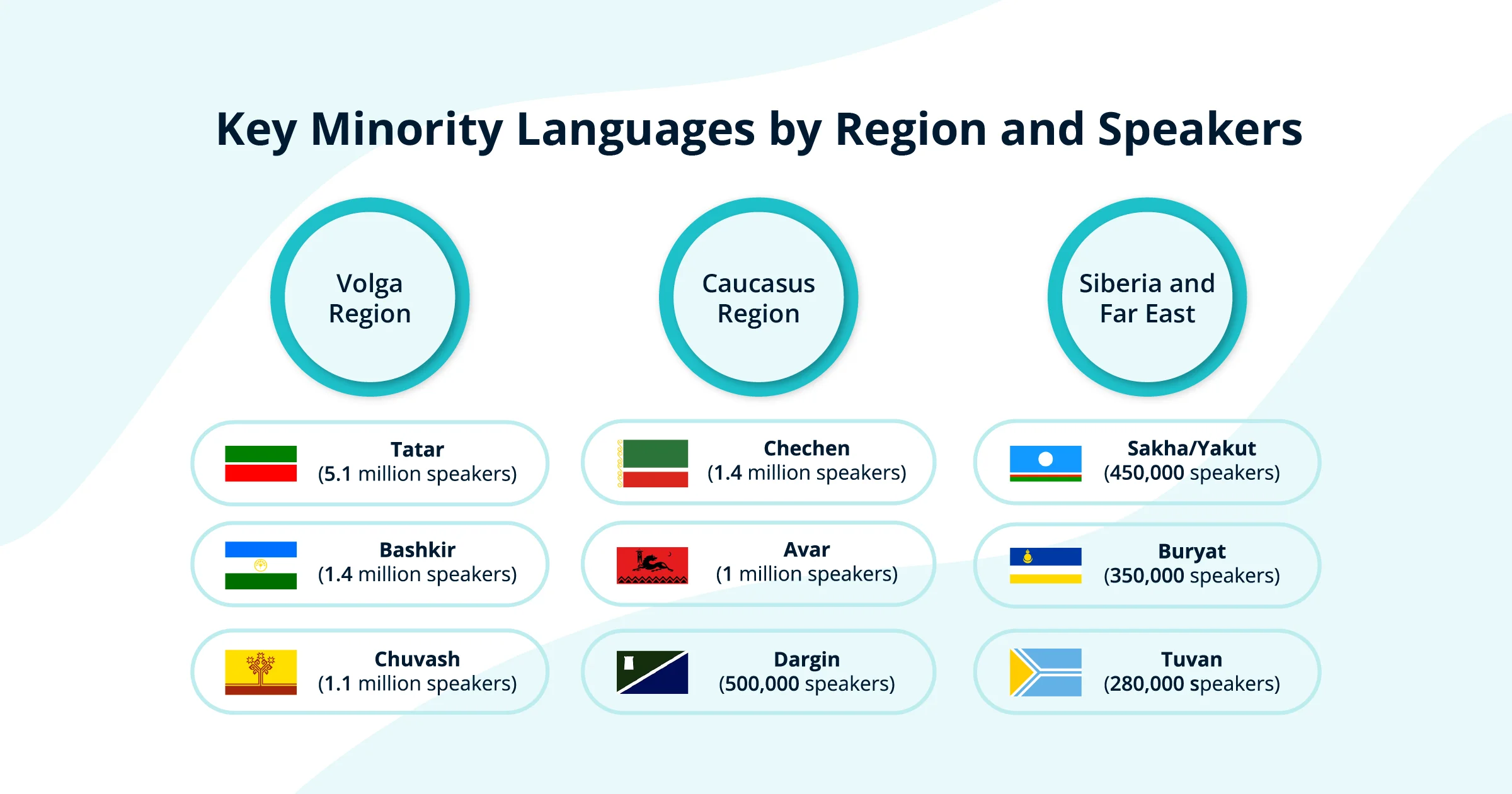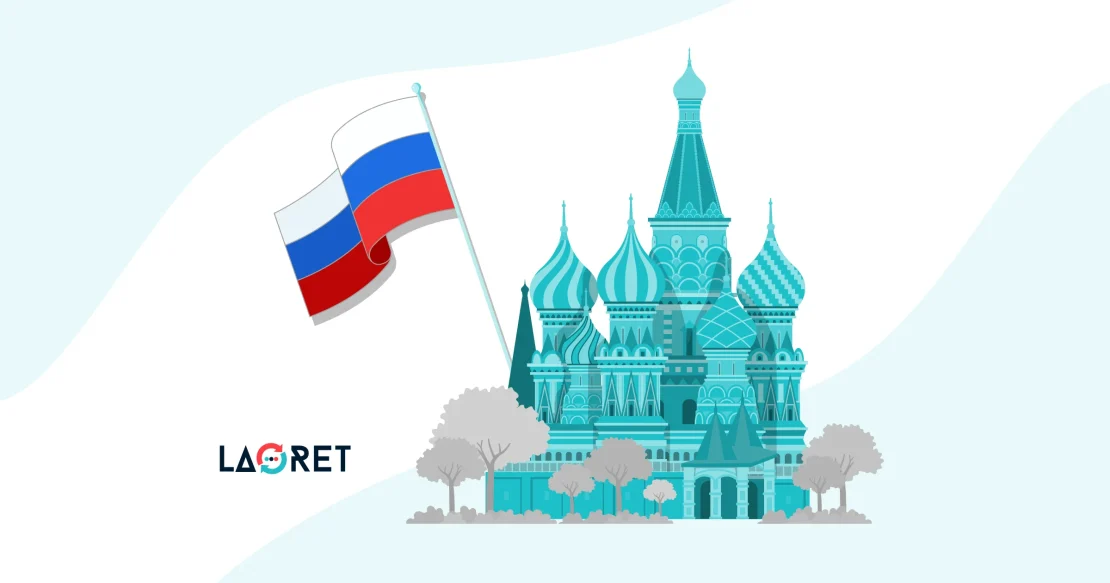Your Guide to Languages Spoken in Russia for Effective Business Communication
When we think of languages in Russia, the Russian language typically comes to mind as the dominant one. However, Russia is home to about 100 languages that highlight the rich heritage of its diverse ethnic groups, each with unique histories and customs.
For organizations looking to enter this market, recognizing this linguistic diversity is crucial to not overlook significant opportunities. In this blog, we’ll explore the prominence of Russian and the minority languages that enrich the country’s culture.
Let’s start!
Russian: The Official Language of the Russian Federation
The Russian language stands as the only official language at the federal level in the Russian Federation. As an East Slavic language written in the Cyrillic alphabet, Russian serves as the fundamental language of Russia in all spheres of public life. It unifies communication across the nation’s vast territory, from government operations and legal proceedings to education and mass media.
For businesses targeting the Russian market, proficiency in Russian is essential. While English may be used in some international business contexts, Russian dominates:
- Business negotiations and contracts
- Marketing materials and advertising
- Customer service and support
- Product documentation and compliance
- Digital presence and eCommerce
Businesses communicating in Russian show commitment to the market and build stronger relationships with local partners and customers. Proficient Russian language skills can be crucial for success in this market. However, Russian language translation can be quite challenging.
Key Challenges in Russian Translation
- Linguistic Complexity
Russian grammar features 6 cases, complex verb systems, and flexible word order. Gender agreement and extensive prefix/suffix usage add layers of complexity beyond direct translation.
- Technical Aspects
The cyrillic alphabet needs proper integration as text is subjected to expansion (20-30% longer than English) and there are different format conventions:
- Dates: DD.MM.YYYY (Russian) vs MM/DD/YYYY (English)
- Special characters and numerals
- Cultural & Business Considerations
Varying levels of formality in business communication exist as (formal ‘vy’ vs informal ‘ty’), cultural reference adaptation, and industry-specific terminology with high-quality digital optimization for Russian platforms like VKontakte.

These challenges highlight why professional Russian translation services are crucial for Russian market entry. Next, we’ll explore how Russia’s minority languages add another layer of consideration for businesses.
Major Minority Languages Spoken in Russia
The Russian Federation is home to an extraordinary linguistic mosaic. While Russian dominates as the most widely spoken language, the nation harbors over 100 minority languages spoken across its vast territories. Each ethnic group maintains its distinct linguistic heritage, creating one of the world’s most diverse language landscapes.
Key minority languages by region and speakers:

These languages continue to play vital roles in local administration, education, cultural preservation, regional media, and community identity
Key Minority Languages of Russia: A Closer Look
Tatar Language:
Tatar is a prominent Turkic language ranked second among languages spoken in Russia with over 5 million speakers, mainly in the Republic of Tatarstan but extending across various regions of Russia. It plays a significant role in business, education, and media throughout the Volga region.
Chechen:
Used predominantly in the Chechen Republic, Chechen serves around 1.4 million speakers and is vital for local governance, education, and business relations in the North Caucasus, including North Ossetia.
Bashkir:
Bashkir, another Turkic language with 1.4 million speakers, is important in the Republic of Bashkortostan, influencing business and culture in the southern Urals.
Ukrainian:
Ukrainian, a vital member of East Slavic languages, is related to Russian and Belarusian but distinct in identity. It has a significant presence in Russia, especially in border regions with notable communities in places like the Komi Republic.
Chuvash:
With approximately 1.1 million speakers, Chuvash is crucial for the Chuvash ethnic group in the Republic of Chuvashia, impacting regional business and culture.
In summary, these minority languages reflect Russia’s cultural diversity and the unique contributions of various language families to the country’s linguistic heritage.
Language Families Represented in Russia
Language is a complex system best understood through language families—groups of languages derived from a common ancestor. Exploring these families reveals historical connections and language evolution.
For example, the Indo-European family includes English, Spanish, Hindi, and Russian, showcasing similarities in vocabulary and grammar that reflect their migration and development.
Understanding these families enhances our appreciation for the cultural contexts that shape languages and highlights the interconnectedness of cultures. Russia’s linguistic landscape features multiple language families, each representing distinct migrations, traditions, and identities.
Turkic Languages: The largest non-Slavic language family in Russia includes:
- Tatar: Most widely spoken in Russia
- Bashkir: Prominent in the Ural Mountains
- Chuvash: Distinctive features among Turkic languages
- Sakha/Yakut: Dominant in Siberia
- Altai, Tuvan, Khakas: Important in Southern Siberia
Uralic Languages
- Komi, Udmurt: Finno-Ugric languages in the European North
- Mari, Mordvin: Vital in the Volga region
- Plus several smaller Siberian languages
Northeast Caucasian Languages
- Chechen, Ingush: Major languages of the North Caucasus
- Avar, Dargin, Lezgin: Key in Dagestan, with Avar as the largest indigenous language
Mongolic Languages
- Buryat: Principal Mongolic language
- Kalmyk: Spoken in European Russia
Indo-European Languages
- Ossetian: Iranian branch
- German, Armenian: Notable minority communities
Understanding this linguistic diversity is crucial for businesses in Russia, enabling culturally sensitive communication and stronger market connections. But why does language strategy matter in the Russian market?
Entering the Russian Market?
Success in Russia’s dynamic market requires more than just Russian language proficiency. While Russian serves as the primary business language, understanding the country’s complex linguistic landscape is key to genuine market penetration.
Why Cultural Adaptation Matters
The most successful international brands don’t just translate – they create culturally resonant experiences. This means adapting product names, marketing messages, and user interfaces to align with local cultural norms. These adaptations help brands become local favorites rather than foreign entities.
Regional Opportunities Often Overlooked
What many businesses miss are the untapped opportunities in regional markets. Take Tatarstan, where incorporating Tatar alongside Russian in marketing materials shows cultural respect while accessing over 5 million potential customers. Similar opportunities exist in Bashkortostan, the North Caucasus, and the Republic of Sakha.
Keys to Market Success
- Professional Russian translation
- Cultural adaptation of content
- Strategic use of regional languages
- Digital presence optimization
The most effective market entries combine these elements into a comprehensive approach that builds trust and recognition. Whether launching products or establishing partnerships, your language strategy should reflect the linguistic diversity of your target regions while maintaining professional standards in Russian communications.
Unlock the Power of Multilingual Communication with Laoret
Russia’s linguistic diversity presents both challenges and opportunities for businesses. At Laoret, we offer Russian translation services and localization solutions to help you engage with Russian-speaking audiences.
Whether you need accurate translations or industry-specific expertise, our team ensures your message resonates.
Contact us to learn how our language solutions can boost your success in the Russian market.






